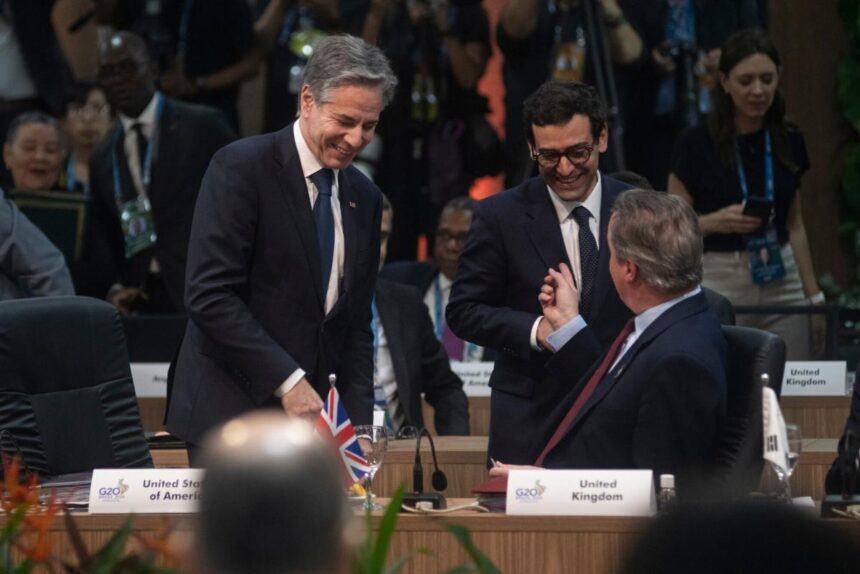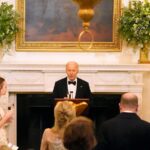(Bloomberg) — The first major ministerial meeting of Brazil’s Group of 20 nations presidency ended with no shortage of talk about ongoing conflicts in Europe and the Middle East but little progress toward resolving them.
Most Read from Bloomberg
Foreign affairs ministers from the world’s largest countries spent the past two days holed up in meetings in Rio de Janeiro, their first encounter since Hamas’s attack on Israel sparked a full-blown war last October. Russia’s invasion of Ukraine, meanwhile, is approaching its second anniversary with Vladimir Putin’s forces back on offense.
The majority of nations present again condemned Russia’s actions in Ukraine, reiterating a position many have held from the outset. The group achieved “virtual unanimity” for the creation of a Palestinian state, Brazil Foreign Minister Mauro Vieira said, an idea that has long enjoyed broad support among G-20 nations but that Israel has rejected. They all agreed that the United Nations Security Council, which has effectively paralyzed itself amid the conflicts, needs new members and sweeping reforms, but they remain far apart on what changes are necessary.
“It’s one thing to do the diagnosis,” Josep Borrell, the European Commission’s top foreign affairs official, said of the institutional reforms Thursday morning. “And another to do the therapy.”
Read More: Two Wars Are Poisoning the Political Debate Everywhere
The struggles, while widely anticipated, highlight the identity crisis facing the G-20, a body that for most of its 25-year history operated primarily as a forum for economic collaboration but is now searching for a sense of purpose as wars upend global politics, reshape markets and disrupt trade.
That will present a challenge for Brazil, the group’s rotating president, as it attempts to keep the conflicts from overshadowing its broader ambitions for the year, including a push for major climate action and reforms to global governing institutions like the Security Council and International Monetary Fund.
More Than War
Intent on avoiding the sort of foreign policy disagreements that threatened India’s larger goals for the G-20 a year ago, Brazilian officials have said they want to confine debates about the conflicts to meetings of foreign affairs ministers.
Wednesday’s discussion was devoted almost entirely to the wars, with India’s representative eventually urging counterparts against allowing them to consume all of the group’s oxygen, according to a person familiar with the meeting who requested anonymity because they were not authorized to speak publicly.
Russian Foreign Minister Sergei Lavrov lambasted “the West” over the conflicts, while US Secretary of State Antony Blinken, UK Foreign Secretary David Cameron and others condemned Russia’s continued presence in Ukraine.
But the hostilities were almost entirely absent from Thursday’s session, which focused heavily on Brazil’s institutional reform ideas, Norway Foreign Minister Espen Barth Eide told Bloomberg News.
“The purpose of yesterday was to get it on the table, speak about it, and get it off, in a sense,” Eide said of the conflicts. “The conversation today would not have been possible without yesterday, and today it was practically free of any reference to war.”
Brazil also stuck to its plan to avoid crafting a joint statement that could bog the group down in disagreements, with Vieira instead reading off a short list of conclusions at a brief press conference Thursday afternoon.
On to Sao Paulo
President Luiz Inacio Lula da Silva has long pushed reforms to global institutions like the IMF in order to make them more representative of the so-called Global South, and has made it a priority for this G-20 as he seeks to re-establish Brazil’s role as the leader of the developing world.
Brazilian officials, including Vieira, have also argued that the complex global landscape makes its reform agenda even more urgent.
Read More: Lula Calls for IMF, World Bank Reforms in First G-20 Speech
Even if they remain far from agreed upon, that the reforms featured prominently in the foreign affairs meetings may pave the way for more substantive discussions next week, when finance ministers and central bank chiefs descend on Sao Paulo for talks that fall more in line with the G-20’s traditional scope.
That gathering will also provide the first indication of whether Brazil can succeed in confining disputes over the conflicts to the G-20’s foreign affairs officials while shifting focus to its primary goals: fighting poverty and combating climate change.
Most Read from Bloomberg Businessweek
©2024 Bloomberg L.P.




